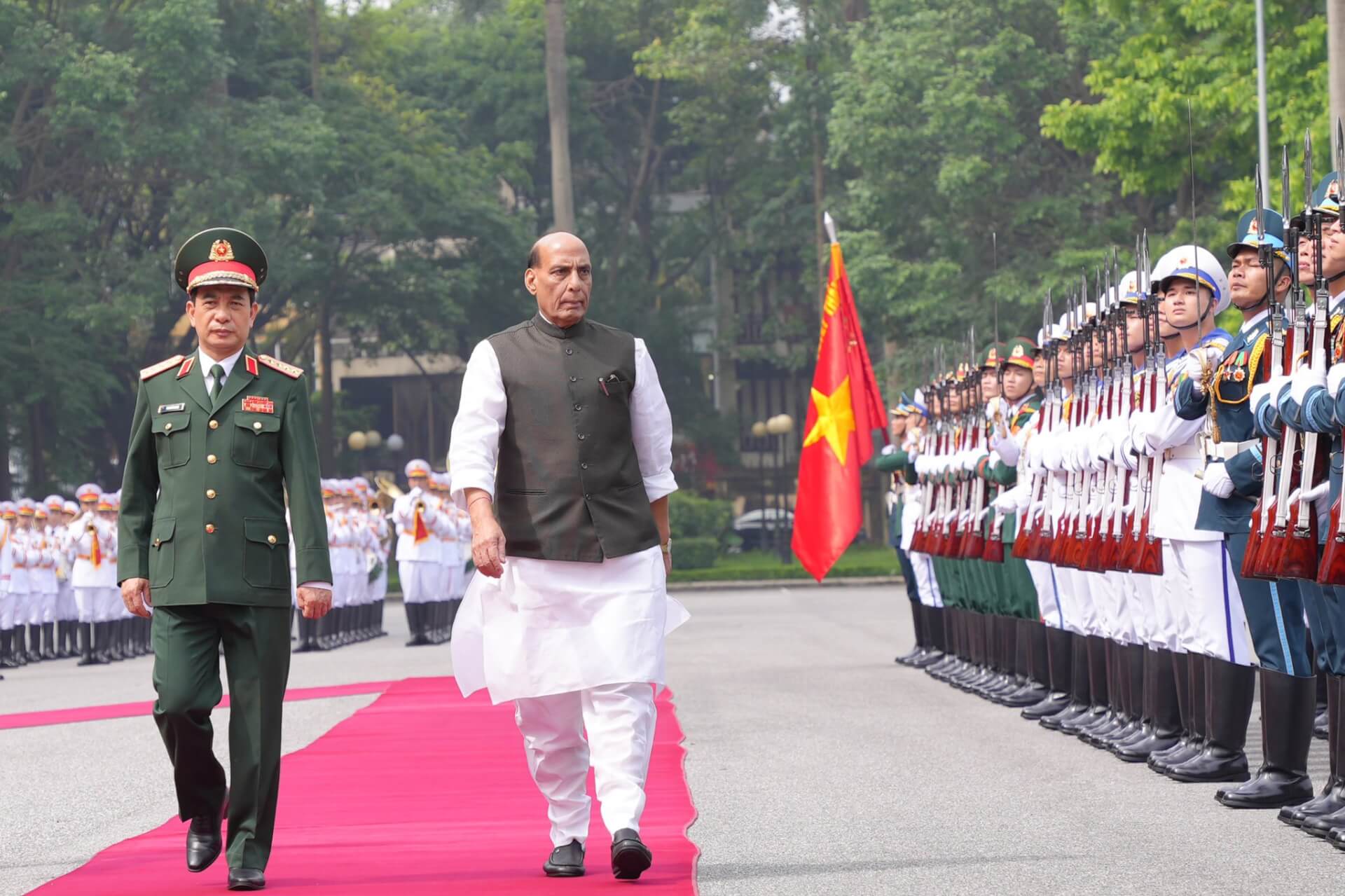India and Vietnam on Wednesday inked a vision statement aimed at enhancing defence cooperation during Defence Minister (DM) Rajnath Singh’s two-day visit to the country, as Hanoi called on New Delhi to use its big power status to ensure respect for international law across the region.
A statement released by the Indian Defence Ministry said that the DMs of the two countries signed a ‘Joint Vision Statement on India-Vietnam Defence Partnership towards 2030,’ which will “significantly enhance the scope and scale of existing defence cooperation.”
The Indian DM, who is on a three-day trip to Vietnam, signed the document along with his counterpart Gen. Phan Van Giang in Hanoi. “We renewed interactions on expanding bilateral cooperation. Our close Defence and Security cooperation is an important factor of stability in the Indo-Pacific region,” Singh said.
Had an excellent meeting with General Phan Van Giang, the Defence Minister of Vietnam. We renewed interactions on expanding bilateral cooperation. Our close Defence and Security cooperation is an important factor of stability in the Indo-Pacific region. pic.twitter.com/lI0RCDHZbU
— Rajnath Singh (@rajnathsingh) June 8, 2022
The DMs shared “wide-ranging discussions on effective and practical initiatives to further expand bilateral defence engagements and regional and global issues,” he added.
The pair also signed an MoU on Mutual Logistics Support that was hailed as a “major step towards simplifying procedures for mutually beneficial logistic support.” The MoU is also the first time Vietnam has signed such an agreement with any country.
Additionally, the ministers agreed to finalise a $500 million line of credit to improve Vietnam’s defence capabilities and further the Indian government’s ‘Make in India, make for the World’ initiative.
Visited the Mausoleum of the Founding Father of Vietnam, President Ho Chi Minh and paid respectful homage to the great leader. pic.twitter.com/zewPsqeRcQ
— Rajnath Singh (@rajnathsingh) June 8, 2022
Singh also announced that India will provide Vietnam with 12 high-speed boats. “Glad to attend the ceremony marking the successful completion of the project to build 12 High-Speed Guard Boats for Vietnam Border Guard at Hong Ha Shipyard in Vietnam today,” he said on Twitter.
“India and Vietnam share a Comprehensive Strategic Partnership and defence cooperation is a key pillar of this partnership,” he remarked, adding. “Vietnam is an important partner in India’s Act East policy and Indo-Pacific vision.”
Indian defence minister Rajnath Singh hands over 12 High Speed Guard Boats to Vietnam.They are built under the USD 100 million Defence Line of Credit by Govt. of India. pic.twitter.com/Ge7tbIp5bx
— Sidhant Sibal (@sidhant) June 9, 2022
Meanwhile, Phan stressed on “the importance of maintaining peace, stability, security, safety and freedom of navigation and over-flight in the East Sea,” which China refers to as the South China Sea. He said that settling disputes in the East Sea should be in accordance with principles laid out by international treaties, including the United Nations Convention on the Law of the Sea (UNCLOS), in a clear reference to China.
Delighted to call on the President of Vietnam, H.E. Nguyen Xuan Phuc in Hanoi today. India and Vietnam continue to work on the basis of remarkable convergences and deep mutual trust to develop an even stronger cooperative agenda. pic.twitter.com/mlBRs8xaBH
— Rajnath Singh (@rajnathsingh) June 8, 2022
Phan also stressed the need to “fully and effectively” implement all signed agreements as well as improve the effectiveness of dialogue and consultation. Furthermore, he invited Indian military leaders and defence companies to “advocate and participate in the international defence exhibition hosted by Vietnam at the end of this year.”
Singh also separately met with Prime Minister (PM) Pham Minh Chinh and President Nguyen Xuan Phuc. During his meeting with the PM, Singh affirmed the need to make “unremitting efforts to strengthen bilateral cooperation on the basis of trust, sincerity and responsibility.” Pham, in turn, assured Singh that Vietnam “will create the most favourable conditions for the defence ministries and militaries of the two countries.”
The Vietnamese PM noted that the two countries share a vital relationship through their engagements in the United Nations and the Non-Aligned Movement. Likewise, he expressed hope that India will leverage its “major power” status to enshrine ASEAN (Association for Southeast Asian Nations) centrality in the regional security architecture and push for the “effective implementation” of UNCLOS.
I thank Vietnam’s Prime Minister, H.E. Pham Minh Chinh for receiving me in Hanoi. We had warm & rich discussions on realizing the full potential of 🇮🇳 & 🇻🇳 Comprehensive Strategic Partnership. Deeply appreciate his positive approach & focus towards deepening bilateral relations. pic.twitter.com/uZi8OfzJBi
— Rajnath Singh (@rajnathsingh) June 8, 2022
Pham also thanked India for its assistance in disease prevention and control; high-quality human resources training; digital transformation promotion; climate change response, natural disaster prevention and control; and green and circular economy development.
Furthermore, he extended an invitation to his Indian counterpart Narendra Modi to visit Vietnam.
Vietnam shares historically cordial ties with India and has more recently become a crucial partner in India’s Act East and Indo-Pacific policies. Both countries have also found common ground in their rivalry with China, as Hanoi has territorial disputes with Beijing in the South China Sea.
Against this backdrop, India and Vietnam have stepped up their military cooperation, especially in the field of maritime security. Last year, both countries agreed to increase collaboration on maritime and regional security issues. In 2016, India and Vietnam upgraded their relationship to the level of comprehensive strategic partnership. Since then, defence cooperation has been a strong pillar of the rapidly expanding bilateral relationship and India has been an enthusiastic supporter of Vietnam’s naval modernisation.

